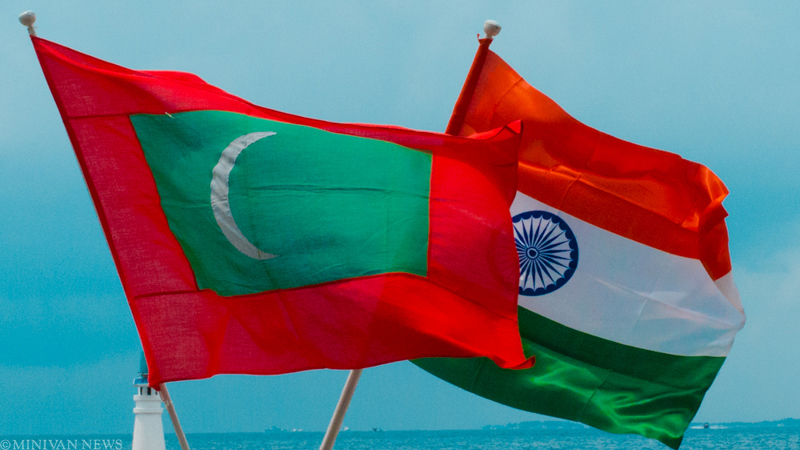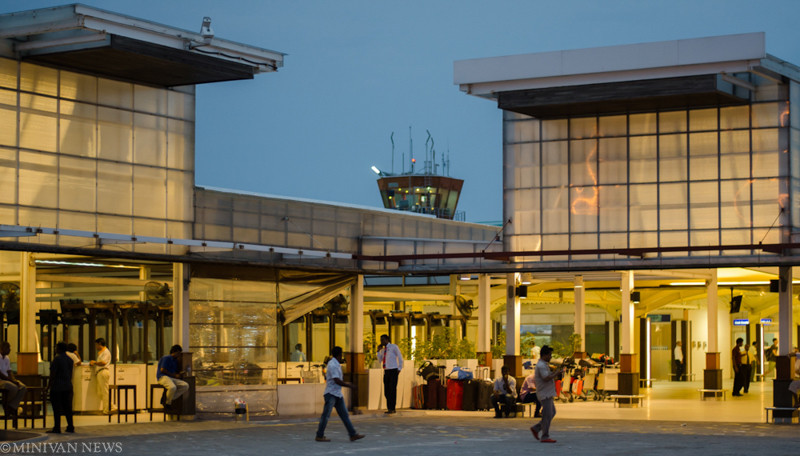Indian infrastructure giant GMR has filed a claim for US$1.4 billion in compensation from the Maldives, following the government’s sudden termination of its concession agreement to manage and upgrade Ibrahim Nasir International Airport (INIA).
According to Indian media, the 75 page claim for “wrongful termination” of the concession agreement includes payments to subcontractors and loss of profits over the lifespan of the 25 year agreement.
Both the government and the state-owned Maldives Airports Company Limited (MACL) will be invited to respond, with a final court order in the case expected in March 2014.
In separate Singapore-based arbitration proceedings one of the project’s lenders, Axis Bank, is also seeking payment of US$160 million for a loan guaranteed by the Maldivian Finance Ministry.
Axis Bank recently raised concerns with MACL and the government, after President Mohamed Waheed moved to create a state-owned airport company and transfer to it MACL’s management responsibilities.
The prospect of MACL’s assets being dissipated led Airports Council International (ACI), the global body representing the world’s airports, to advise its members to exercise caution before making any investment in the Maldives relating to INIA, warning of “legal and financial risks”.
The government subsequently dropped the attempt, after its Attorney General Aishath Bisham warned that President Waheed had exceeded his authority in appointing board members to the new entity.
The lead up to eviction
GMR, in consortium with Malaysia Airports, narrowly won the International Finance Corporation (IFC)-managed bid for the airport in 2010, and signed the agreement with MACL under the former government of Mohamed Nasheed
The then-opposition, including the Progressive Party of the Maldives (PPM), People’s Alliance (PA), Dhivehi Qaumee Party (DQP) and Adhaalath Party (AP), opposed the agreement primarily on nationalistic grounds, and alleged corruption in the bidding process.
Other concerns raised by the opposition at the time included the prospect of GMR allowing Israeli military aircraft to stop over in the Maldives and refuel “after bombing Arab countries”.
The DQP then filed a civil court case, managing to block the developer’s charging of an Airport Development Charge (ADC) stipulated in the concession agreement, on the grounds it was a tax and therefore required parliamentary approval.
Backing the concession agreement, the Nasheed government permitted the airport developer to deduct the ADC from its share of the revenue as a stopgap measure, while it sought to appeal.
However shortly afterwards the Nasheed government was deposed during February 7 2012’s controversial transfer of power, and the opposition parties assumed control of the government – and the prospect of paying GMR for the development of the airport.
The government received US$525,355 from the airport for the first quarter of 2012, compared to the US$8.7 million it was expecting, at time it was facing a crippling budget deficit, a foreign currency shortage, plummeting investor confidence, spiraling expenditure, and a drop off in foreign aid.
In the second quarter GMR presented MACL with a bill for US$1.5 million, and in the third quarter, US$2.2 million.
“The net result of this is that the Maldivian government now has to pay GMR for running the airport,” wrote DQP Leader and newly-appointed Special Advisor to President Mohamed Waheed, Dr Hassan Saeed, in a self-described “candid” letter to Indian Prime Minister Manmohan Singh.
A subsequent report by the government’s own Auditor General (AG) found concession revenue due the government had plummeted fourfold as a result of the court verdict sought by Saeed’s own party while it was in opposition.
According to the report, net concession revenue to the government had fallen to just US$6,058,848 in 2012, compared to US$25,424,877 in 2011.
Rather than appeal the Civil Court verdict obstructing the ADC, “The new government took the view that it would not be proper for it to intervene in the legal process for the benefit of a private concern,” the report noted, and instead, on April 19 2012, the informed the developer it was “retracting the previous agreement [to offset the ADC] on the grounds that the then Chairman of MACL did not have the approval of the MACL board to make the agreement.”
GMR asserted that this decision was a political event as defined within its concession agreement, and warned that this would amount to a breach of the agreement by the government.
“The government did not accept this argument,” noted the AG.
Seeking a way out of the agreement but wary of the heavy penalties in the termination clause, the government accused the World Bank’s IFC of “irresponsibility” and “negligence” in its conduct of the bidding process.
“The government must also consider how much money has to be paid back as compensation if terminating the agreement,” said Attorney General at the time, Azima Shukoor, during a prescient press conference in September 2012.
“It is clear to all of you that the Maldives financial and economic situation is at a critical level, and in this situation [termination] is not an easy thing to do,” Shukoor said.
In August 2012, with the new terminal and refurbishment 25 percent complete according to the government’s outside engineering assessment, the government ordered a halt to construction pending new ‘regulatory approvals’, and demanded a second runway not included in the original agreement.
GMR agreed to construct an emergency runway and proposed exempting Maldivian nationals from paying the ADC as a compromise. The company received no response to the offer.
Dr Hassan Saeed meanwhile issued a pamphlet calling for the cancellation of the agreement, likening it to “taking bitter medicine to cure a disease” or “amputating an organ to stop the spread of cancer.”
In his letter to Indian Prime Minister Manmohan Singh, dated September 19 2012 and obtained by Minivan News, Saeed further claimed that “GMR and India ‘bashing’ is becoming popular politics”, and warned that “as a result, “the Maldives is becoming fertile ground for nationalistic and extremist politicians.”
“I want to warn you now that there is a real danger that the current situation could create the opportunity for these extremist politicians to be elected to prominent positions, including the Presidency and Parliament on an anti-GMR and anti-India platform,” Saeed informed Singh.
Saeed went on to accuse GMR of extensive bribery, including the payment of “millions of dollars to buy MPs to get a parliamentary majority for the then ruling Maldivian Democratic Party”.
He claimed that “politicians and MPs who end up in GMR’s pocket keep silent but no one – with the exception of former President Nasheed and his key associates – have defended the indefensible GMR deal in public.”
Eviction
In late 2012 the government declared the concession agreement ‘void ab initio’ (invalid from the outset), and gave GMR seven days’ notice to leave the country.
The move swiftly followed the Singapore Supreme Court’s lifting of an injunction blocking MACL from taking over the airport pending arbitration proceedings, on the grounds the arbitration court had no jurisdiction to prevent the Maldives as a sovereign state from expropriating the airport.
The full verdict however did not exempt the government from compensation for this maneuver. In fact, according to the verdict document, Financial Controller for the Ministry of Finance Mohamed Ahmed “affirmed in an affidavit that the Maldives government would honour any valid and legitimate claim against it. He also stressed that the Maldives government had never defaulted on any of its payments.”
Moreover, lawyer representing MACL, Christopher Anand Daniel, “also accepted that if the arbitration tribunal found that the Appellants were wrong in their asserted case that the Concession Agreement was void ab initio and/or had been frustrated, but the Appellants had by then already gone ahead with the taking over of the airport, they would at least be liable to compensate the respondent for having expropriated the airport” (emphasis retained).
ACC exonerates airport deal
The Auditor General’s report acknowledged allegations of corruption in the deal, but finding the evidence “not conclusive on this point”, deferred to the judgement of the Anti-Corruption Commission (ACC).
That arrived on June 17, 2013, in the form of a 61 page investigative report that concluded that the bidding process was conducted fairly by the IFC, and that the GMR-MAHB consortium won the contract by proposing the highest net present value of the concession fee.
The ACC further concluded that the awarding of the contract did not contravene amendments brought to the Public Finance Act requiring parliamentary approval for such agreements.
Furthermore, “Considering the situation (2008, 2009 and 2010) when the decision was made to privatise the Male’ International Airport,” the ACC’s calculations showed that MACL would make a profit of about US$254 million in 25 years if the airport was operated by the government-owned company.
Conversely, the government would receive about US$534 million in the same period from the GMR consortium if the airport was privatised, the ACC found.
Reactions
Following publication of the ACC’s report, the government has backed away from allegations of corruption and instead declared to evict the developer was made due to its impact on state finances.
“Back before the government took back control of the airport from GMR, the reason we gave was that the deal was bleeding the country’s economy. We were paying GMR to keep them here,” President’s Office Spokesperson Masood Imad told Minivan News last week.
Azima Shukoor meanwhile labelled ACC’s report “incomplete” and “lacking professionalism”, in an interview with local media.
“There’s no contradiction between the government’s decision and the ACC report. We never levelled any corruption charge in terminating the agreement,” said the former Attorney General, in an interview with local media.
“Did [the ACC] omit the factors deliberately or unknowingly or simply just overlooked them? But a lot of factors have been overlooked and omitted from the report. The state will suffer great losses because of it. Especially when the country is tied up in [arbitration proceedings],” Shukoor was reported as saying.
“The state did a thorough investigation of the contract, including what happened during and after the signing of the agreement. So the government’s legal position doesn’t and shouldn’t change due to the report. We made a very firm decision,” she said.
Speaking at a campaign rally on the island of Thimarafushi in Thaa Atoll, former President Nasheed observed that the figure sought by GMR as compensation amounted to more than the annual state budget of the Maldives.
“Even today in my view it is one of the most important duties of the People’s Majlis to renew the contract, find a way to hold discussions with the company over [renewal], and save the Maldives from the great misfortune our people are about to face,” he said.
Former President Maumoon Abdul Gayoom’s PPM have meanwhile laid the blame for the airport debacle on President Waheed, accusing him of “ignoring advice”.
“We told the next President Mr Waheed that he should hold discussions with the GMR Group and the Indian government to arrive at an acceptable solution, after which the government was free to act on its own,” he said. “Unfortunately, this was not done and suddenly there was this unhappy ending,” Gayoom was reported as saying in the Hindu, following a visit to India and a meeting with Prime Minister Singh.
Following the PPM’s apparent turnaround on the GMR issue, Parliamentary Group Leader of the Waheed-aligned Dhivehi Rayithunge Party, Dr Abdulla Mausoom, said it was in fact senior figures in the PPM who were among the most vocal supporters for terminating the GMR agreement.
“It is ironic that we are hearing these statements from the PPM, whose leader has been witnessed supporting rallies demanding the cancellation of the [GMR] agreement,” he said.
Likes (1)Dislikes
(1)Dislikes (0)
(0) 

